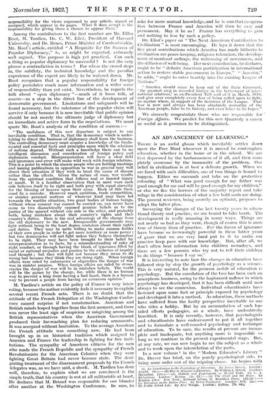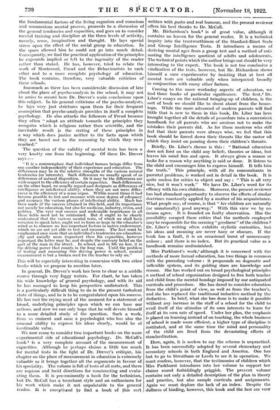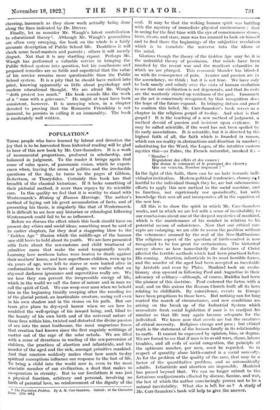AN ADVANCEMENT OF LEARNING.* THERE is an awful gloom which
inevitably settles down upon the Free Mind whenever it is moved to contemplate education, whether in the home or in the school. We are first depressed by the barbarousness of it all, and then com- pletely overcome by the immensity of the problem. Our belief in civilization is at best a delicate growth. When we are faced with such difficulties, one of two things is bound to happen. Either we succumb and take on the protective colouring of " What was good enough for my father was good enough for me and will be good enough for my children," or else we flee the horrors of the majority report and take refuge in the consideration of what a few bold souls are doing. The present reviewer, being secretly an optimist, proposes to adopt the latter plan.
Surveying the changes of the last twenty years in educa- tional theory and practice, we arc bound to take heart. The development is really amazing in many ways. Things arc not nearly so bad as they were, though of course this is more true of theory than of practice. For the forces of ignorance have become so increasingly powerful in these latter years of grace that we arc very hard put to it to make our practice keep pace with our knowledge. But, after all, we don't often beat information into children nowadays, and there are a few parents who try not to tell their children to do things " because I say so."
It is interesting to note how the changes in education have followed step by step the growth of psychology as a science. This is very natural, for the primum mobile of education is psychology. But the correlation of the two has been such an amorphous business, owing to the haphazard maimer in which psychology has developed, that it has been difficult until now always to see the connexion. Individual educationists have fastened upon some fact or principle exposed by psychology and developed it into a method. As education, these methods have suffered from the faulty perspective inevitable to one who rides a hobby. But by an accumulation of such lop- sided efforts pedagogics, as a whole, have undoubtedly benefited. It is only recently, however, that psychologists and educationists have endeavoured to put it all together and to formulate a well-rounded psychology and technique of education. To be sure, the results at present are incom- plete and inadequate, but anything more is impossible so long as we continue in the present experimental stage. But, at any rate, we can now begin to see the subject as a whole and to work upon the interrelation of the parts.
In a new volume 1 in the " Modern Educator's Library " Dr. Dreyer has tried, on the purely psychological side, to bring some order out of the reigning chaos. He begins with (1) An Introduction to the Psychology of Education. By James Dreyer. London: Arnold. [8s.1— (t) to Measure in Education. By William A. McCall. London: Macmillan. 1150.1—(3) Methods and Experiments in Mental Tests. By C. A. Richardson. London : Harrap. [is. 8d4—(4) The Child and the Home. By Benton Miser. New York: national Living. 61 Hamilton Place. i$2.50c.1— () Education on the Dalton Plan. By Helen Parkhurst. London: Bell. 156.1— (61 Public School Life. By Alec Waugb. LOIld011 : En. 611.1 the fundamental factors of the living organism and conscious and unconscious mental process, proceeds to a discussion of the general tendencies and capacities, and goes on to consider mental training and discipline at the three levels of activity, namely, sense, imagination and thought. He lays special stress upon the effect of the social group in education. In the space allowed him he could not go into much detail. Consequently, we find the practical application of the principles he expounds implied or left to the ingenuity of the reader rather than stated. He has, however, tried to relate the work of Montessori, Freud and the Behaviourists to each other and to a more complete psychology of education. The book contains, therefore, very valuable criticism of these schools.
Inasmuch as there has been considerable discussion of late about the place of psycho-analysis in the school, it may not be amiss to record here Dr. Drever's main conclusions upon this subject. In his general criticisms of the psycho-analysts, he lays very just strictures upon them for their frequent assumption that psycho-analysis provides in itself a complete psychology. He also attacks the followers of Freud because they often " adopt an attitude towards the principles they recognize which is religious rather than scientific, and the inevitable result is the stating of these principles in a way which does justice neither to the facts upon which they are based nor to the reasoning by which they were reached."
The question of the validity of mental tests has been a very knotty one from the beginning. Of these Dr. Dreyer says :-
" It is a commonplace that individual human beings differ from one another independently of their experience and education. The differences may be in the relative strengths of the various natural tendencies (or interests). Such differences we usually speak of as differences of natural disposition. Or it may be the differences are with respect to the efficiency of certain capacities. Such differences, on the other hand, we usually regard and designate as differences of intelligence or intellectual ability, where they are not mere differ- ences in the efficiency of a sense organ. Within recent times it had become possible to test and measure with some degree of adequacy and accuracy the various phases of intellectual ability. Much has been made of the success attained in this field, and its importance not merely for education, but also for medicine, industry, civics, and politics. The very real success and undeniable importance in all these fields need not be minimized. But it ought to be clearly understood that the various mental tests, of which we shall have occasion to speak later, ought not to loom so large in the educator's mind as to obscure no less important factors in native endowment, which we are not yet able to test and measure. The fact must be emphasized once more that an individual's tendencies are education- ally and socially more important than his capacities, however important the latter may be, and despite the contrary belief on the part of the man in the street. In school, and in life no less, it is the driving power that counts in the long run. Until the problem of testing and measuring this driving power is solved, mental measurement is but a broken reed for the teacher to rely on."
This will be especially interesting in connexion with two other books which we propose to mention later.
In general, Dr. Drever's work has been to clear us a middle course through very foggy waters. For chart, he has taken his wide knowledge of general psychology, and with its aid he has managed to keep his perspective undistorted. This is a particularly difficult thing to do in the present turbulent state of things, and he is to be congratulated upon his success. He has met the crying need of the moment for a statement of broad, underlying principles upon which we can base our actions, and now we can only hope that he will devote himself to a more detailed study of the question. Such a work, from so eminent and sane a psychologist who has also the unusual ability to express his ideas clearly, would be of inestimable value.
We now come to consider two important books on the more experimental side of educational psychology. Dr. McCall's book s is a very complete account of the measurement of capacities. Although he perhaps claims a little too much for mental tests in the light of Dr. Drever's critique, his chapter on the place of measurement in education is extremely valuable as it brings together all the arguments in favour of his speciality. The volume is full of tests of all sorts, and there are copious and lucid directions for constructing and evalu- ating them. It is pre-eminently a book for the technician, but Dr. McCall has a trenchant style and an enthusiasm for his work which make it not unpalatable to the general reader. It is exceptiwal to find a book of this sort
written with gusto and real humour, and the present reviewer offers his best thanks to Dr. McCall.
Mr. Richardson's books is of great value, although it contains no leaven for the general reader. It is a technical inquiry into the trustworthiness of the Stanford-Binet Scale and Group Intelligence Tests. It introduces a means of deriving mental ages from a group test and a method of esti- mating the intelligence quotient of adults and adolescents.
The technical points which the author brings out should be very interesting to the expert. The book is not too conclusive a
vindication of the tests, however, but Mr. Richardson shows himself a sane experimenter by insisting that at best all mental tests are valuable only when interpreted broadly in conjunction with many other factors.
Coming to the more workaday aspects of education, we find three books of particular significance. The first,* Dr. Liber's essays on the rational bringing-up of children, is the sort of book we should like to shout about from the house- tops. While the more advanced of modern parents will find little that is new to them in this book, Dr. Liber has here brought together all the details of procedure into a convenient handbook for all parents who are anxious not to make the mistakes their parents did. As for those moderns who still feel that their parents were always wise, we feel that this book should be forced down their throats like the castor oil which they insist on pouring down their children's throats.
Briefly, Dr. Liber's _theme is this : " Rational education does not foist on the child any beliefs, theories or ideas, but leaves his mind free and open. It always gives a reason or looks for a reason why anything is said or done. It listens to the child and encourages him to express himself. It tells him the truth." This principle, with all its concomitants in parental problems, is worked out in detail in the book. It is quite useless for critics to object and say : " This is all very nice, but it won't work." We have Dr. Liber's word for its efficacy with his own children. Moreover, the present reviewer has had abundant opportunity to observe the effects of similar doctrines constantly applied by a mother of his acquaintance.
What people say, of course, is that " her children are naturally (or unnaturally) good anyway." With this view we by no
means agree. It is founded on faulty observation. Has the possibility escaped these critics that the methods employed may be responsible for the seeming " goodness " of the children?
Dr. Liber's writing often exhibits stylistic curiosities, but his ideas and meaning are never hazy or obscure. If the book has a fault, it is an occasional burst of unnecessary ardour ; and there is no index. But its practical value as a handbook remains undiminished.
Miss Parkhurst's work,' although it is concerned with the methods of more formal education, has two things in common with the preceding volume : it propounds no dogmatic and inflexible system, and its guiding stars are knowledge and reason. She has worked out on broad psychological principles a method of school organization designed to free both teacher and child from the mental bondage imposed by our antiquated curricula and procedure. She has dared to consider education from the child's point of view, as well as from the teacher's, and she has replaced the traditional inductive method by the deductive. In brief, what she has done is to make it possible without any increase in the staff of a school for the child to avail itself of the stimulus of its own interests to learn for itself at its own rate of speed. Under her plan, the emphasis is placed on learning instead of on teaching, the whole business of school is made more efficient, a higher type of discipline is instituted, and at the same time the mind and personality of the child are freed from the devastating effects of standardization.
Here, again, it is useless to say the scheme is unpractical. It has been successfully adopted by several elementary and secondary schools in both England and America. One has but to go to Streatham or Leeds to see it in operation. We must confess, however, that the testimonies of children which
Miss Parkhurst introduces into her volume to support her claims sound forbiddingly priggish. The present volume contains not only a detailed description of the plan in theory and practice, but also sample curricula and assignments. Again we must deplore the lack of an index. Despite the dullness of binding, however, this book and the last are very
cheering, inasmuch as they show work actually being done along the lines indicated by Dr. Dreyer.
Finally, let us consider Mr. Waugh's latest contribution to educational theory 6. Although Mr. VVaugh's generalities are often very sweeping, the book on the whole is a fairly accurate description of Public School life. Doubtless it will shock some head-masters and parents ; others it will merely disgust. Not that it is any startling exposé. Perhaps Mr. Waugh has performed a valuable service in bringing the Public School system into question, but his conclusions and proposed remedies are so futile and superficial that the value of his service remains more questionable than the Public School system. It is a pity that he should have rushed into print, knowing apparently so little about psychology and modern educational thought. We are afraid Mr. Waugh " doth protest too much." His book sounds like the work of a " man with a grievance." He might at least have been consistent, however. It is annoying when, in a chapter devoted to proving that the Romantic Friendship is not immoral, he persists in calling it an immorality. The book is moderately well written.








































 Previous page
Previous page